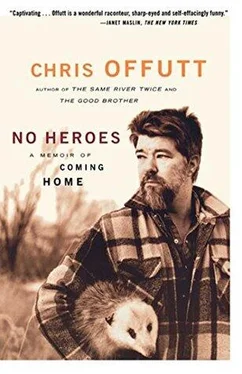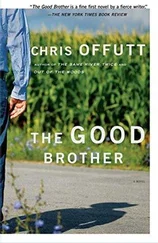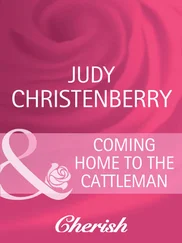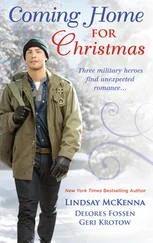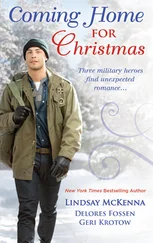I followed her to brief meetings with various administrators. MSU has a lovely setting with high hills as a backdrop to the buildings. Spring’s pastel trees were patched dark where the sun hit. I remembered hours throwing Frisbees here. We wore shabby clothes, protested disco music, and mourned Lynyrd Skynyrd. My wallet contained rolling papers instead of money. We felt free. Now I felt like an impostor, the butt of a colossal group joke. Any minute someone would say: “Just kidding, Chris. We don’t hire locals or ex-curb painters. Now get the hell out of here.”
Walking the length of campus took ten minutes, and I headed back along Main Street, looking at the hills silhouetted against the sky. These woods were the cradle of my personal civilization, my own promised land. I grew up walking the same dirt for sixteen years, then began driving it. Town was where the groceries were, the doctor and the drugstore. Town was special. Town was exciting. Town was a half hour’s drive on a narrow road that followed a creek. I recalled each incarnation of a restaurant now converted to apartments. Stores were gone, but their sites were forever known to locals as “where Allen’s used to be,” or “Parney’s old place.” Directions to newcomers were disastrous— “Drive up Main past the old post office and turn where Bishop’s was, I don’t know the name of the street, then head down to where they’ve got that new stuff going on. Park by the old Big Store.” Directions in the hills were just as confusing—“Go out sixty past the wide place, go left at the creek, go three hollers up and make a right. If you hit Sharkey, you’ve gone about twenty miles too far, but there’s no sign for it. You’ll just know.”
A car slowed beside me. The smiling driver was a wild friend from college, now transformed into a straitlaced pillar of the community. She had not only quit her outlaw ways, but she now behaved as if her past belonged to someone else. She drove me ten miles out of town to see a house. I asked Vondelle about various mutual friends, some dead, some vanished, most reformed. A few still lived as we had, managing to maintain a dope and whiskey lifestyle while pursuing careers and having families, although the “plumb wald” times were relegated to weekend parties, where cops hid on old dirt lanes waiting to arrest people as they left. Knowing the backroads was still crucial to living here.
“I spent all these years away dreaming of coming home,” I said.
“I spent the same years thinking about leaving.”
“It’s easy to leave.”
“Not for me,” Vondelle said. “This is where I went to. Nobody in my family finished high school. I came here for college.”
She had married the most exotic man available, an artist from off, which meant beyond the county line. He had no people. No one knew his history. He dropped into the hills fully formed and self-contained, like trailers on a ridge. Without a past, he had no enemies, no fears, no obligations. Vondelle had been a hippie artist from a tough county, full of confidence and glee at living in Morehead, eastern Kentucky’s den of iniquity. She liked to laugh, and party hardy. She had been resplendent with the enthusiasm of youth, determined to leave her mark. These days Vondelle and her husband no longer made art.
She turned onto a side road and began driving uphill, taking two turns past a large pond that shimmered in the sun. A duck skidded to a halt beside a cluster of cattails. Birds made a symphony in the trees. She drove slowly up a steep road to a large house. The property included two outbuildings and a section of a wooded hill. We walked along the front slope covered with butterweed and larkspur swaying below white oaks.
I told her I wanted to be alone and she nodded. Redbud blossoms hazed the hills, specked in spots by dogwood. My mouth felt dry and my heart beat fast. For the first time in five years I stepped into the woods. The smell of fresh earth was instantly calming. A pair of sparrows chased a jay. Everything was familiar — the scent, the sight, the light, the dirt.
I walked into the woods and sat on a wind-felled tree a few feet off the ground, a massive hickory rotten through the guts. A pileated woodpecker swam the air, a black and white swirl that landed on a dead maple. It scaled ten feet of trunk in three-step hops, probing the bark for food. I tipped my head to watch and my weight shifted and I fell backward. I gripped the bark tightly but could not fully regain stability. The strength in my arms began to wane beneath the inexorable pull of the earth. The bark scraped my sleeves as I eased my head to the ground, feet aimed at the sky. After five minutes in the woods, I was upside down.
I began to laugh, which caused me to tip until my legs crashed into the undergrowth. I curled instinctively to an infants posture of the womb, my eyes inches from last years leaves. My laughter subsided to a ragged breathing. I surrendered to the years of stifled yearning, weeping with relief at lying alone in the woods of home.
Time seemed to bend as if pressing a nail to a sheet of plastic until it punctured and I entered the intervening space. I had always lain here. I had never abandoned Kentucky. There was no pattern of departure and return, only the seasonal cycle of death and life. Yesterday I had left winter in the west and traveled to spring, a time of hope and portent. The hills flourished with energy. I could smell the moldering decay and the fresh buds twining in one scent. Beside my face an acorn’s slender tendril aimed toward the sky, a thin root tethering it to earth. A sense of contentment passed through me like the hint of summer rain. I had no mind, no thought.
Eventually the chill of the earth revived me and I sat, feeling as if I had fallen into my heart. Beneath a leaf I found a morel, pale as a minnow. It needed a week of sun and rain to draw it through the leaves. In a month it would be rotted black. I looked about the woods and vowed to return before the mushroom died. As if in answer, a breeze slid along the lower boughs.
I walked out of the woods to the car, where Vondelle sat. “I’m buying this place,” I said.
There was a sadness to her expression, as if she wished she were emerging from the woods with a tear-streaked face and a sense of certainty. She had two sons, the same as me, but hers were a decade older. This was a house for young boys to grow up in, not teenagers to leave. I understood that she brought me to the house precisely because she couldn’t have it, as if her knowledge of its availability was a welcoming gift. Vondelle dropped me in Morehead near the realtor’s office.
Town culture is taciturn and guarded while giving the impression of being open and friendly. Lives are ruined by a chance encounter in a grocery store parking lot, during which one person didn’t notice a neighbor, who felt hurt by the slight. People driving by gave me the Morehead Stare— a long sideways gaze. Originally a response to being part of a small town, where you looked at everyone carefully to see if you should wave or not, the Morehead Stare had blossomed into tradition. The best response was to wave at everyone.
The realtor and I spent a few minutes asking each other about our families. I told him about the house and wrote a check for earnest money. The realtor was surprised that I could buy a house without stepping inside. He said that his wife would never let him do that. I told him we had rented our last four houses over the phone. Each time we arrived with our fingers crossed in a rental truck. He shook his head in an incredulous fashion. He’d lived all his life in Morehead, worked in the family business, and was engaged in politics. As a child I had envied the privilege of his family, and now he envied my travels. Our lives had arced into equality — we were both Rowan Countians of the age when men accumulate power, forge alliances, and run towns. We were educated locals, a scarce commodity in the hills.
Читать дальше
